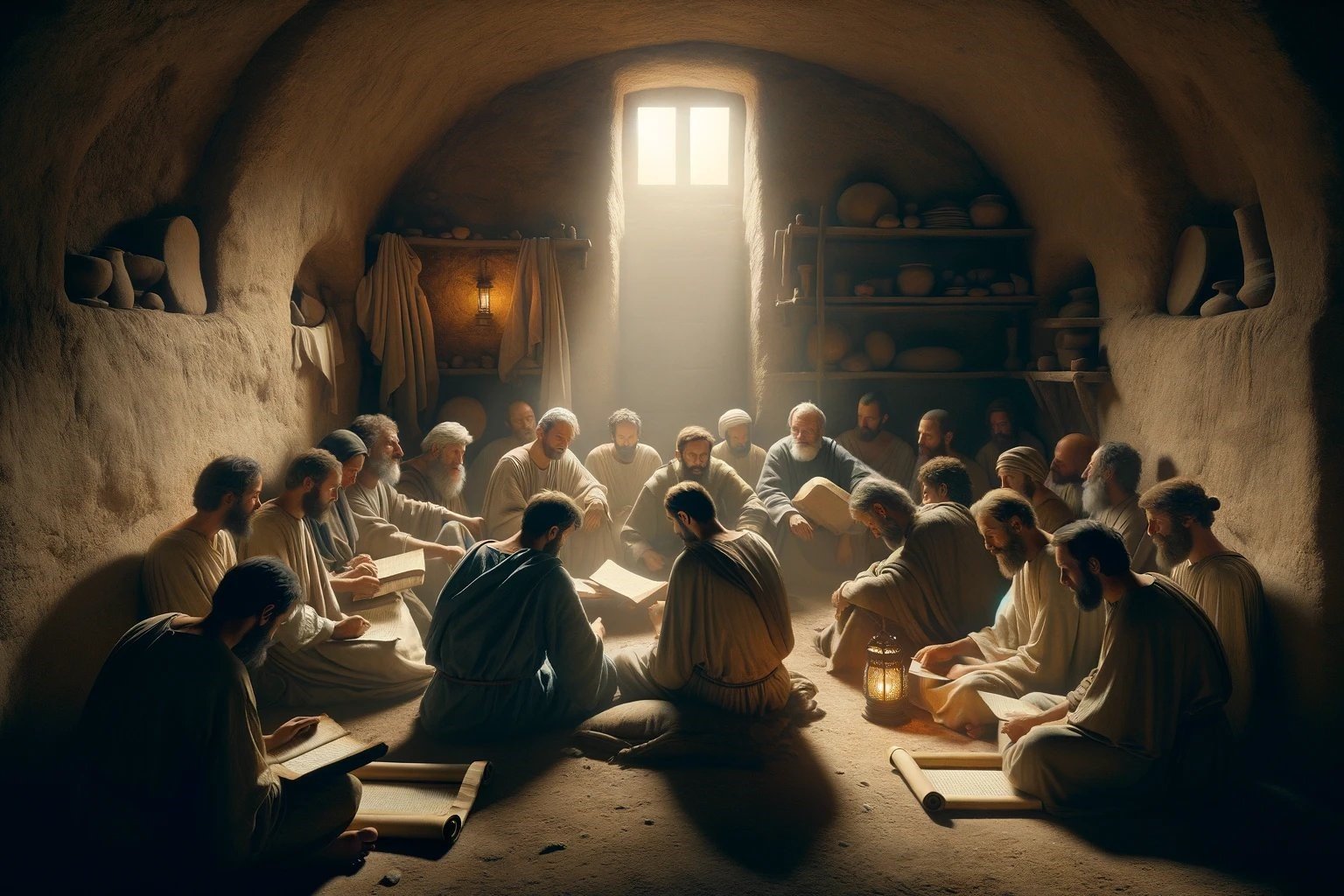Home>Bible Facts>Who Are The Nicolaitans In The Book Of Revelation


Bible Facts
Who Are The Nicolaitans In The Book Of Revelation
Published: February 11, 2024
Ericka Andersen, an editor at Christian.net, expertly merges digital strategy with content creation, focusing on faith and societal issues. Her communication skills enhance the platform's engaging narratives, fostering meaningful dialogue on belief's impact on society.
Discover the truth about the Nicolaitans in the Book of Revelation and their significance in biblical history. Explore fascinating Bible facts and insights.
(Many of the links in this article redirect to a specific reviewed product. Your purchase of these products through affiliate links helps to generate commission for Christian.net, at no extra cost. Learn more)
Table of Contents
Introduction
The Book of Revelation, the final book of the New Testament, is known for its vivid imagery, prophetic messages, and mysterious symbolism. Among the intriguing references in this apocalyptic text is the mention of the Nicolaitans. These enigmatic figures have sparked curiosity and debate among scholars and theologians for centuries. Their significance within the context of Revelation has led to various interpretations and speculations, making them a subject of great interest for those seeking to understand the deeper layers of biblical prophecy.
The mention of the Nicolaitans in the Book of Revelation is brief but impactful, as it raises questions about their identity, beliefs, and influence within the early Christian community. Unraveling the mystery of the Nicolaitans requires delving into historical context, theological perspectives, and the symbolic language of Revelation. By exploring these aspects, we can gain valuable insights into the significance of the Nicolaitans and their relevance to the message conveyed in the Book of Revelation.
As we embark on this exploration, it is essential to approach the subject with an open mind, recognizing the complexities and nuances inherent in biblical interpretation. The study of the Nicolaitans offers a compelling opportunity to engage with the rich tapestry of biblical symbolism and the enduring relevance of ancient texts in contemporary discourse. Through a thoughtful examination of the Nicolaitans in the Book of Revelation, we can uncover profound truths that resonate across time and continue to inspire contemplation and dialogue within the realm of biblical scholarship.
Read more: Who Was The Book Of Revelation Written For?
The Nicolaitans in the Book of Revelation
The Nicolaitans are mentioned in the Book of Revelation, specifically in the letters to the seven churches in Asia Minor. In Revelation 2:6, it is commended that the Ephesian church hates the works of the Nicolaitans, which the Lord also hates. Additionally, in Revelation 2:15, the church in Pergamum is criticized for tolerating those who hold the teaching of the Nicolaitans. These references provide valuable but cryptic insights into the nature of the Nicolaitans and their significance within the early Christian context.
The exact identity and beliefs of the Nicolaitans remain a subject of scholarly debate and speculation. The name "Nicolaitans" is derived from the Greek words "Nikolaos" and "laos," which can be interpreted to mean "conqueror of the people" or "victor over the laity." This etymology has led to various interpretations regarding the nature of their teachings and practices. Some scholars suggest that the Nicolaitans may have promoted a hierarchical or elitist structure within the Christian community, potentially advocating a form of spiritual elitism or compromising with pagan practices. However, the precise details of their doctrines and activities remain elusive, adding to the enigmatic aura surrounding the Nicolaitans.
The mention of the Nicolaitans in the letters to the seven churches underscores the significance of their influence and the potential threat they posed to the integrity of the early Christian congregations. The fact that the Ephesian church is commended for hating the works of the Nicolaitans indicates a clear stance against their teachings, while the rebuke directed at the church in Pergamum for tolerating the Nicolaitans' doctrine highlights the need for vigilance and discernment within the Christian community.
The brief but impactful references to the Nicolaitans in the Book of Revelation serve as a reminder of the challenges faced by the early Christians in navigating issues of doctrine, morality, and spiritual fidelity. The symbolic language of Revelation invites readers to contemplate the enduring relevance of these messages and their implications for contemporary Christian faith and practice. By delving into the significance of the Nicolaitans within the context of Revelation, we can gain valuable insights into the complexities of early Christian communities and the enduring relevance of their struggles and triumphs.
This section provides a foundational understanding of the Nicolaitans in the Book of Revelation, setting the stage for further exploration of their historical background, interpretations, and theological implications.
Historical Background of the Nicolaitans
The historical background of the Nicolaitans is shrouded in mystery, and scholarly consensus regarding their origins and activities remains elusive. The primary source of information about the Nicolaitans is the Book of Revelation, where they are mentioned in the context of the letters to the seven churches in Asia Minor. While the biblical references provide valuable insights, piecing together a comprehensive historical background requires careful examination of early Christian writings, historical context, and theological interpretations.
The name "Nicolaitans" is derived from the Greek words "Nikolaos" and "laos," which has led to various interpretations regarding the nature of their teachings and practices. Some early Christian writers, such as Irenaeus and Hippolytus, offered insights into the Nicolaitans, suggesting that they may have been associated with Nicolas, one of the seven deacons appointed in the early Christian community as recorded in the Book of Acts. However, the extent of Nicolas' involvement with the Nicolaitans and the precise nature of their beliefs remain subjects of speculation and scholarly inquiry.
Historical context also plays a crucial role in understanding the Nicolaitans. The early Christian communities in Asia Minor faced diverse challenges, including social, cultural, and religious influences that shaped their theological outlook and communal dynamics. The presence of pagan cults, philosophical schools, and imperial cult worship in the region likely contributed to the complexities of early Christian identity and the emergence of divergent theological perspectives.
The symbolic language of Revelation, with its vivid imagery and prophetic warnings, reflects the tumultuous historical backdrop against which the Nicolaitans and the seven churches operated. The letters to the seven churches convey the urgency of addressing internal and external threats to the integrity of the Christian faith, underscoring the significance of historical context in interpreting the messages directed at the Nicolaitans.
As we seek to unravel the historical background of the Nicolaitans, it is essential to approach the subject with humility and scholarly rigor, recognizing the limitations of available historical sources and the interpretive challenges inherent in studying ancient texts. By engaging with the historical context of the Nicolaitans, we can gain a deeper appreciation for the complexities of early Christian communities and the enduring relevance of their struggles in shaping the trajectory of Christian thought and practice.
This exploration of the historical background of the Nicolaitans sets the stage for delving into the diverse interpretations of their significance within the Book of Revelation and the theological implications arising from their enigmatic presence in early Christian history.
Interpretations of the Nicolaitans in the Book of Revelation
The enigmatic references to the Nicolaitans in the Book of Revelation have sparked a wide array of interpretations and speculations among scholars, theologians, and biblical exegetes. These interpretations stem from the cryptic nature of the biblical passages mentioning the Nicolaitans and the historical context in which they emerged. As a result, multiple perspectives have emerged regarding the identity, beliefs, and significance of the Nicolaitans within the framework of Revelation.
One interpretation suggests that the Nicolaitans represented a sect or group within the early Christian community that promoted a form of spiritual elitism or hierarchical structure. This perspective is based on the etymology of the name "Nicolaitans," which can be interpreted to mean "conqueror of the people" or "victor over the laity." According to this view, the Nicolaitans may have advocated a system of religious hierarchy that distinguished between a spiritual elite and the broader Christian laity, potentially leading to divisions and power imbalances within the community.
Another interpretation posits that the Nicolaitans were associated with compromising or syncretistic tendencies, potentially blending Christian teachings with pagan or libertine practices. This perspective is informed by the historical context of the early Christian communities in Asia Minor, where they encountered diverse cultural and religious influences. The rebuke directed at the church in Pergamum for tolerating those who held the teaching of the Nicolaitans suggests a potential challenge to maintaining doctrinal purity and moral integrity within the Christian congregations.
Furthermore, some interpretations explore the symbolic significance of the Nicolaitans within the broader thematic framework of Revelation. The letters to the seven churches convey not only historical messages but also symbolic and prophetic dimensions that resonate across time. From this perspective, the Nicolaitans may symbolize broader challenges faced by the early Christian communities, such as internal divisions, moral compromise, and the need for unwavering faithfulness amidst external pressures.
These diverse interpretations reflect the complexity and richness of the biblical text, inviting readers to engage with the symbolic language of Revelation and its enduring relevance for understanding the complexities of early Christian history. By exploring the various interpretations of the Nicolaitans, we gain valuable insights into the multifaceted nature of biblical symbolism and the interpretive challenges inherent in studying ancient texts.
This section provides a glimpse into the diverse perspectives surrounding the Nicolaitans in the Book of Revelation, setting the stage for a deeper exploration of the theological implications arising from their enigmatic presence within the biblical narrative.
Theological Implications of the Nicolaitans
The enigmatic presence of the Nicolaitans in the Book of Revelation carries profound theological implications that resonate across the centuries. The symbolic language of Revelation, with its vivid imagery and prophetic warnings, invites readers to contemplate the enduring relevance of the Nicolaitans' message within the broader theological framework of Christian faith and practice.
One theological implication of the Nicolaitans lies in the challenge of maintaining doctrinal purity and moral integrity within the Christian community. The rebuke directed at the church in Pergamum for tolerating those who held the teaching of the Nicolaitans serves as a poignant reminder of the perennial struggle to uphold the foundational tenets of the Christian faith amidst cultural, social, and ideological pressures. This theological implication prompts believers to remain vigilant against compromising influences and to uphold the uncompromising truths of the Gospel.
Furthermore, the potential association of the Nicolaitans with hierarchical or elitist tendencies raises theological questions about the nature of Christian leadership and the equitable distribution of spiritual authority within the body of believers. The teachings of the Nicolaitans, if indeed promoting a hierarchical structure, stand in contrast to the servant leadership model exemplified by Jesus Christ and emphasized in the New Testament. This theological implication underscores the importance of servant-hearted leadership and the empowerment of all believers to exercise their spiritual gifts within the community of faith.
Moreover, the symbolic significance of the Nicolaitans within the broader thematic framework of Revelation prompts theological reflection on the enduring struggle between light and darkness, truth and deception, and faithfulness and compromise. The Nicolaitans, as symbolic representations of internal divisions and moral compromise, serve as cautionary figures, reminding believers of the spiritual warfare inherent in the Christian journey. This theological implication calls for steadfastness, discernment, and unwavering commitment to the truth of the Gospel in the face of external pressures and internal challenges.
In essence, the theological implications of the Nicolaitans in the Book of Revelation extend far beyond historical conjecture, inviting believers to engage with profound questions about the nature of Christian faith, the integrity of the church, and the enduring relevance of biblical truths in the midst of ever-changing cultural landscapes. By delving into these theological implications, readers are prompted to deepen their understanding of the complexities of early Christian communities and the timeless relevance of their struggles in shaping the trajectory of Christian thought and practice.
Read more: Who Is The Woman In Book Of Revelation
Conclusion
The enigmatic presence of the Nicolaitans in the Book of Revelation serves as a compelling reminder of the complexities and challenges faced by the early Christian communities in Asia Minor. The brief but impactful references to the Nicolaitans within the letters to the seven churches have sparked centuries of scholarly inquiry, theological reflection, and interpretive diversity. As we conclude our exploration of the Nicolaitans, it is evident that their significance extends beyond historical conjecture, inviting readers to engage with profound theological implications and enduring questions about the nature of Christian faith and practice.
The historical background of the Nicolaitans, though shrouded in mystery, reflects the dynamic interplay of social, cultural, and religious influences that shaped the early Christian communities. The symbolic language of Revelation, with its prophetic warnings and exhortations, underscores the urgency of addressing internal and external threats to the integrity of the Christian faith. The Nicolaitans, whether representing hierarchical tendencies, compromising influences, or symbolic challenges, embody the enduring struggle for doctrinal purity, moral integrity, and unwavering faithfulness within the Christian community.
The diverse interpretations of the Nicolaitans highlight the richness and complexity of biblical symbolism, inviting readers to explore the multifaceted layers of meaning embedded within the text of Revelation. Whether viewed as historical figures, symbolic representations, or cautionary examples, the Nicolaitans prompt theological reflection on the nature of Christian leadership, the struggle against compromise, and the enduring relevance of biblical truths in the face of cultural and ideological pressures.
In conclusion, the enigmatic presence of the Nicolaitans in the Book of Revelation transcends mere historical curiosity, offering profound insights into the enduring challenges and theological implications that continue to resonate within the Christian faith. By engaging with the complexities of the Nicolaitans, readers are invited to delve deeper into the timeless truths of the Gospel, the call to unwavering faithfulness, and the enduring relevance of biblical messages for contemporary believers. The enigma of the Nicolaitans stands as a testament to the enduring power of biblical symbolism and the timeless relevance of the Book of Revelation in shaping the theological landscape of Christian thought and practice.














